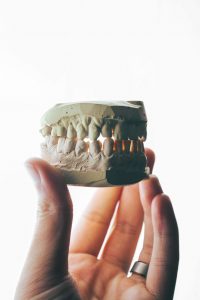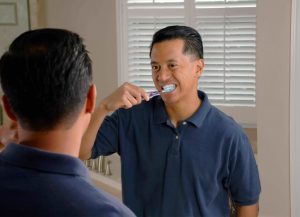Is Alcohol Bad for Your Teeth?
Most people are familiar with the impacts of heavy drinking on the liver, brain, and other organs. But excessive alcohol use can affect your outward appearance too—including your skin, and even your teeth. And jeopardizing your oral health means risking more than just your beautiful smile. Poor oral health can also translate to poor health overall.
So, what exactly is the relationship between alcohol and your teeth? Let’s examine the risks, and what you can do about it.
How Does Alcohol Affect Your Teeth?

Photo by Amr Taha™ on Unsplash
Alcohol affects your teeth in several ways. For starters, alcohol is dehydrating, so it dries out the mouth and reduces saliva flow. Saliva naturally rinses bacteria and plaque from teeth. People with alcohol use disorder tend to have higher plaque levels than non-alcoholics, increasing the risk of tooth decay.
The high sugar content of many alcoholic drinks can also contribute to tooth decay and cavities. The bacteria in your mouth feed on sugar. If you drink wine that’s high in sugar, or mix alcohol with sugary sodas or fruit drinks, your mouth becomes an environment where bad bacteria thrive.
Next, liquor, wine, and beer are all acidic, and acid breaks down tooth enamel. According to the American Dental Association, even squeezing lemon or lime into a drink contributes to enamel erosion. Worn enamel, combined with high bacteria and plaque levels from the problems mentioned above, can spell disaster for your teeth.
Finally, if you struggle with excessive alcohol use (or any substance), you may unintentionally neglect your hygiene. Have you ever forgotten to brush your teeth after a night of drinking? If this happens often, it can significantly harm your oral health.
Does Alcohol Stain Your Teeth?
When it comes to alcohol and teeth, too much of certain beverages can also take the shine out of your smile.
Dark-colored sodas, grenadine, red wine, and some juices get their color from pigmented chemical compounds called chromogens. Chromogens cling to weakened tooth enamel and discolor, dull, or stain teeth. The tannins found in drinks like red wine also contribute to staining and discoloration. Darker beers can have the same effect.
While some stains are temporary, long-term drinking often results in long-term stains. Stains that bind to your teeth are difficult to remove, even with the help of whitening products. Unlike alcohol’s other effects on teeth, staining is not a health concern. However, you may feel self-conscious about tooth discoloration, or even hesitant to smile in social situations and photos.
How Does Alcohol Affect Your Gums?
Unhealthy teeth often means unhealthy gums as well. A 2015 study found that alcohol-dependent individuals had more periodontal bacteria than people who didn’t drink or drank occasionally. They also had worse periodontal status, meaning a higher likelihood of gum disease.
Gum disease may result in tooth loss, and it’s linked to arthritis, respiratory disease, and coronary artery disease. That’s because the bacteria that causes gum disease can enter the bloodstream through gum tissue.
Another study concluded that heavy drinking influences overall mouth health. In addition to increasing bad bacteria as mentioned above, alcohol can also decrease the presence of good bacteria. This imbalance contributes to periodontal disease, as well as cancers of the head, neck, and digestive tract.
How to Protect Your Teeth

Photo by National Cancer Institute on Unsplash
In summary, if you’re wondering, “Is alcohol bad for your teeth?,” the answer is that it can be—especially if you drink heavily. And what’s bad for your teeth is also bad for your gums, mouth, and total body health. Excessive alcohol consumption can lead to an imbalance of good and bad bacteria in the mouth, enamel erosion, and higher levels of plaque. Consequences may include tooth decay, cavities, staining and discoloration, gum disease, tooth loss, and eventually even oral cancer.
That’s the bad news. The good news is that there are steps you can take to preserve the beauty of your smile and the health of your body!
Tips For Protecting Your Teeth
- Try drinks with limited sugar content and acidity, and avoid darker drinks and mixers.
- If you do drink red wine, dark beer, or other darker drinks, use a straw to limit contact with your teeth.
- Brush and floss regularly, and always brush your teeth soon after drinking. If you’re away from your toothbrush, drink a glass of water or rinse your mouth.
- Schedule regular trips to the dentist for prevention, maintenance, and treatment as needed.
- Cut back on your consumption of alcohol. All of the effects mentioned in this article are worse for heavy drinkers than for moderate drinkers.
Support for Cutting Back
Of course, cutting back on alcohol isn’t as simple as drinking through a straw or remembering to brush your teeth. It’s a bigger lifestyle change with a far more powerful impact on your overall health. Like any big change, transforming your relationship with alcohol sometimes requires extra support.
Ria Health is a flexible and realistic approach to taking charge of your drinking. Whether you want to drink less or quit entirely, we’re here to help. Our convenient smartphone app gives you access to licensed medical professionals, recovery coaches, and support groups—all from the comfort of your own home. You’ll also get helpful digital tracking tools, and even anti-craving medication if it’s helpful for you.
Will insurance cover treatment? Verify Coverage
Have Questions? Call (800) 504-5360



